- Home
- E. M. Foner
Artists on the Galactic Tunnel Network (EarthCent Auxiliaries Book 4) Page 2
Artists on the Galactic Tunnel Network (EarthCent Auxiliaries Book 4) Read online
Page 2
Two
“Welcome back to Union Station,” the director of EarthCent Intelligence greeted John. “You couldn’t convince your wife to come to our meeting?”
“No, because Ellen’s boss wanted me to come to her meeting, which started five minutes ago,” John replied as he shook Clive’s hand. “I know that the publisher of the Galactic Free Press is your sister-in-law and that you have some sort of information sharing agreement, but if you want to share people as well, you’re going to have to stop scheduling meetings at the same time.”
“For your next visit, we’ll do this in our joint conference room,” Clive said with a grin. “I have to be careful because Chastity is always trying to swipe employees from us. Information analysts and field agents are good fits for a news organization.”
“The way Ellen tells it, journalists are a good fit for a spy agency, and you’re happy to let the Galactic Free Press pay their salaries while they report to EarthCent Intelligence on the sly.”
“That’s only because the paper has a better business model than we do, charging their subscribers not to see ads,” Clive said as he cleared off the chair next to his desk for John. “Everything we talk about today you’re welcome to share with your wife, and I suspect that Chastity is saying something similar to Ellen as we speak.”
“It’ll be a nice change not having to compartmentalize,” John said. “I was never that good at it anyway. What’s the assignment?”
“Have you watched the Grenouthian documentary about all of the cultural artifacts smuggled off of Earth since the Stryx opened the tunnel network connection?”
“We caught it on Flower during the jump back to the tunnel network from Earth Two. Even though I took part in the investigation, I’m still a little confused over whether some of those famous works of art were stolen or not.”
“That’s because there’s no clear answer in many cases,” Clive said. “If you go back to the generation immediately after the Stryx opened Earth, funding for government services collapsed as large chunks of the population left on alien labor contracts. As your wife learned from the governor-general of New York, some elected officials allowed smugglers to plunder the collections of public institutions in exchange for cash. Most alien buyers would make the argument that they were acting in good faith, and in some cases, the originals were replaced with reproductions so flawless that it required laboratory analysis to discover they were gone.”
“I take it the aliens aren’t in a hurry to return their purchases.”
“You take it correctly, but that’s not what your assignment is about. The Grenouthian documentary was only released to the public two months ago and it’s already having an unanticipated effect.”
“I thought all of Earth’s governments had been warned to alert the museums and historical societies about a possible gold rush,” John said. “It would be a real shame if publicizing our past problems leads to humanity’s remaining cultural treasures going missing.”
“We think that the documentary is having a positive effect on that front,” Clive said. “Collectors can no longer play innocent about Earth’s registration system for important works, and according to our contacts with alien intelligence agencies, the black market for stolen art on the tunnel network is actually quite small. The unanticipated problem that I’m referring to is imitation—alien artists cashing in on Earth’s brand.”
“You mean counterfeiting?”
“More like stylistic theft and cross-species appropriation. EarthCent has retained intellectual property attorneys from one of the top interspecies law firms on Union Station to research the issue, but so far it looks like we don’t have a tentacle to hang from.”
“You’ve been spending too much time around Drazens.”
“They are our main allies in the intelligence world,” Clive reminded his agent. “Thanks to President Beyer attracting major alien-owned businesses to open their doors on Earth, the other species now have a financial interest in respecting our intellectual property because they have skin or scales in the game. But the possibility of imitation in the arts is new to us and we don’t really have a handle on how much it will hurt.”
“Let me see if I have this straight,” John said. “Aliens who never would have given human culture a second look before the documentary now think there must be something to it because shady collectors were willing to buy our famous artworks under questionable circumstances?”
“That’s pretty much it in a nutshell. It’s a mystery to me what drives art markets, but my wife keeps up, and she went to a Horten exhibition on the station last week that featured works from their new Humanist school. She even bought a painting of dogs playing poker for our Cayl hound.”
“But the documentary was only released a couple of months ago!”
“Van Gogh completed a painting a day the last two months of his life,” Clive said, watching closely for the other man’s response.
“The artist who cut off his ear?” John asked.
“I knew you were the right choice for this mission. You’re the first agent I’ve had in here who recognized the name.”
“They probably pretended they didn’t know because they could see where the conversation was headed. You’re sending me back to Earth?”
“Just until the Aarden Arts Festival next month,” Clive said. “I want you to visit the major boutiques and studios selling to aliens. Try to get us a number for how important alien purchases are to Earth’s arts economy, and ask people on the business end whether they’re seeing alien works targeted for our markets.”
“One month won’t be enough to scratch the surface of the art world,” John protested. “And I’ll be surprised if the people involved will give me the time of day, especially if they think I’m there to snoop into their sales.”
“It’s not just paintings and sculptures we’re interested in, it’s all of Earth’s culture, including performing arts.” Clive laughed outright at the look on John’s face. “That’s why I advise getting Ellen and her syndicated journalists involved. And I’m not expecting you to produce a comprehensive report. Just get a feel for the potential impact and buy some art that you can display for sale at Aarden. It will be great cover for you to talk with alien buyers, and we’ll see if they sound you out about making black-market purchases.”
“Like a gallery? You’re choosing me to buy paintings and set up a booth at an alien art fair because I knew that poor Vincent cut off part of his ear?”
“See? You even know his first name. And you won’t be there for the entire festival. Each of the major species attending is featured for the Vergallian equivalent of a week during which there’s a juried show with prizes and such. You’ll arrive before the start of Human Week and have a chance to look around. Flower’s schedule won’t get her there in time so we needed an independent like you.” He paused for a moment, as if something had just occurred to him, and asked, “Are you okay with spending a couple of weeks on Aarden?”
“Why wouldn’t I be?” John asked.
“Well, you were fatally poisoned the last time you were there.”
“I was only dead for a little while, as M793qK keeps reminding me, and I don’t have a problem with going back. The Fleet Vergallians did a good job hosting Rendezvous.”
“I’ve been meaning to talk to you about the Farling doctor,” Clive said, lowering his voice despite the fact that his office was as secure as EarthCent Intelligence could make it. “I don’t know quite how to say this so I’ll just put it out there. Herl showed me the file that Drazen Intelligence keeps on you. Their analysts have you marked as a possible triple agent, and I imagine the other intelligence services have reached the same conclusion.”
“But I report to you every time Myort drags me into one of his deals, and everybody and his uncle owes M793qK a favor,” John said. “And why are the Drazens even keeping a file on me? We’re supposed to be allies.”
“We keep files on their agents, the ones we know about. And
I don’t have any concerns about your dealings with Myort or M793qK, but it could affect how some of the alien agencies treat you when you’re seeking cooperation on criminal matters in their jurisdictions.”
“You’re talking about my work with the Interspecies Police Operations Agency.” John frowned. “I’m supposed to give a presentation about our progress at the next ISPOA conference.”
“You’ll work it out,” Clive said. “And here’s my lovely wife to fill you in on your cover story for Earth.”
John shot to his feet to greet Clive’s wife, Blythe, who had grown up on Union Station and co-founded InstaSitter with her younger sister, Chastity. The business was spectacularly successful, employing tens of millions of part-time babysitters from all species on Stryx stations, and Blythe had donated part of her fortune to fund the startup of EarthCent Intelligence. Still in her early forties, she was several years younger than her husband, and the mischievous look on her face alerted John that he was in for a surprise. As soon as the handshake was released, she reached in her purse and produced a programmable cred.
“Expenses for your assignment,” she told him. “I’ve had some dealings in the art world and the best way to get information is to be accepted as a buyer or a buyer’s agent. The top galleries and studios on Earth maintain a blacklist for window shoppers, so the only way we can make your cover solid on such short notice is for you to splash out.”
“Clive told me I’ll be buying stock to sell at the Aarden Arts Festival,” John said. “I don’t know the first thing about it so I’ll stick with unknown artists who sell cheap.”
“He knew Van Gogh’s first name,” Clive told his wife smugly.
“Everybody knows who—is this real?” John interrupted himself when he saw the figure displayed on the programmable cred that Blythe handed him.
“We need to find out what’s going on at the high end of the market because our analysts say that’s where most of the economic activity is, at least in terms of sales amounts,” Blythe explained. “I’m not suggesting that you blow all ten million creds on a famous painting at auction, but flash it around as you shop and the gallery owners will take you seriously. Say you’re buying for the headquarters of my publishing company, and if anybody bothers looking farther than that, they’ll stop when they get to my ownership stake in InstaSitter. If somebody is diligent enough to run a background check on you and finds out you work for EarthCent Intelligence, explain that my husband is your boss and I asked you to shop for me because you’re a trusted family friend.”
John remained frozen in place, holding the programmable cred at arms-length from his body like it was radioactive.
“Do you need her to repeat that?” Clive asked. “You look like you’re in shock.”
“I’ve never seen so many zeros on a programmable cred,” John croaked. “Doesn’t the value decay if I don’t start spending it?”
“Not in four weeks,” Blythe told him, trying not to laugh at the agent’s obvious discomfort. “When you get to Earth, check in with the president’s office. As EarthCent’s director of public relations, Hildy Grueun is always hosting galas and events for well-heeled aliens visiting Earth, and she knows all of the movers and shakers in the art business. I’ve already been in touch with her and she can provide you with a list of both reputable and disreputable galleries and studios. As long as you spend money at reputable outlets, whatever you buy will probably turn out to be a good investment in the long run.”
“Then you really do want me to spend all ten million?”
“As much as you feel is necessary to get the information we need,” Blythe said. “If I’ve learned one thing in the publishing business, it’s that when it comes to culture, the first-mover advantage can be insurmountable. New genres in literature are often associated with a single author or group of authors who end up with eighty percent of the readership. Earth needs all of the capital inflow it can get, and we’re more than a little worried that the aliens will outcompete us in our cultural exports if we don’t move quickly.”
“In our cultural exports to them?”
“To ourselves,” Clive said. “Ultimately, EarthCent’s greatest worry remains the rate at which our people who leave home as contract workers are going native. Given that the aliens are more advanced than us in every way imaginable, it’s easy to understand why our expatriates look up to them. But if the contract workers and their children completely reject their Earth identity, humanity will fragment into isolated populations. Our analysts predict the day will come when people emulating different species won’t even intermarry with each other.”
“Okay, I can see that being a problem, but I still don’t get the art connection,” John said. “Counterfeiting makes sense to me, but who would buy a painting by a Frunge that only reminds them of a Van Gogh, or go to see a Horten band playing Apologist music?”
“You know about Apologist music?” Blythe asked. “I’m impressed.”
“Fiona listens to it. She even has a poster of a lead singer named Cringe. Ellen says it’s not bad once you get used to it, but I’m not that ambitious.”
“Speaking of Ellen, you couldn’t convince her to come?”
“I already asked and she’s in a meeting at the Galactic Free Press,” Clive informed his wife. “Tell your sister that next time John and Ellen are on the station we should plan a joint meeting.”
Blythe pointed at her ear and said, “Speak of the devil.”
“Did you give him the ten million?” Chastity’s voice asked in her sister’s ear.
“I think it scared him,” Blythe subvoced in reply.
“Alright, we’ll talk later,” Chastity said. She lowered her own hand and turned back to Ellen with a smile. “I guess I’m off the hook for funding this outing. Do you have any questions?”
“A zillion,” Ellen said. She smiled politely at Chastity, as one might to a crazy person, and then turned to her immediate superior, the editor of the freelance desk for the Galactic Free Press. “Do you understand what she’s talking about, Roland?”
“It’s a little vague,” he admitted. “I guess the problem is that we’re not really sure there’s a problem, we just want to make sure that one doesn’t arise.”
“This reminds me of why I went to M793qK to quit drinking,” Ellen said. “I was having too many conversations like this in bars.”
“You quit drinking to get John to take you back,” Roland contradicted her.
“My point is still valid. You just told me to give the syndicated journalists I work with on Earth carte blanche to investigate stories about alien interpretations of human culture echoing back on the source. Are you really worried that the Vergallians or Hortens are suddenly so smitten with our art and music that they’ll do a better job at it than we do and squeeze us out of the market?”
“It’s not as crazy as you think,” Chastity told her. “Imagine if alien journalists got it in their heads to start covering humanity in depth. Do you think you’d still have a job, or that I’d be running this paper? I know a lot of us have fallen into the habit of thinking that the half-million-year head start that the Hortens and Drazens have on us explains their success, and all the more so for the other species that have had interstellar travel even longer, but don’t forget that they’re also smarter and better educated than we are.”
“I’d be pretty smart if I graduated from a Verlock university,” Ellen countered.
“You’d be pretty dead if you graduated from a Verlock university—humans don’t live long enough,” Roland told her. “I had the same reaction as you when Chastity first explained it to me, but after I slept on it, her fears seem plausible. If the aliens start doing our culture better than we do, market forces will put all of our creative people out of work.”
“Because of one new Grenouthian documentary?” Ellen asked skeptically. “They’ve been producing documentaries about Earth for at least fifty years, mainly to make fun of us.”
“And that’s the change,”
Chastity said, leaning forward earnestly. “If you were an alien who saw a documentary about human actors poisoning themselves with lead in their makeup or starving artists who committed suicide in obscurity only for society to recognize their genius after their deaths, it would hardly tempt you to try the human oeuvre. But this new documentary focused on the masterpieces that collectors across the galaxy thought well enough of to acquire under questionable circumstances.”
“But what about all of the package tours to Earth the last decade, and the Grenouthian theme parks?” Ellen asked. “There must be tens of millions of aliens who have been exposed to human culture in positive ways.”
“Retirees and family vacations,” Chastity said, waving her hand dismissively. “Sure, there are alien wedding bands on Union Station that will play our music, and some Open University theatre programs perform Shakespeare, but this latest documentary has woken up the tunnel network art world. In the last week alone, I’ve fielded requests from Dollnick, Frunge, and Chert news organizations interested in running our weekend Arts section in translation.”
“They like our creative arts that much?”
“The opposite,” the publisher of the Galactic Free Press said with a laugh. “But any artist will tell you that hate is better than like—at least it’s a stronger emotion. The important thing is to evoke a reaction, and human culture has just gone from largely unnoticed to worth criticizing.”
“And worth writing about,” Roland said significantly. “So on your next Earth trip—when are you leaving?”
“Later today, unless EarthCent Intelligence needs John to stick around,” Ellen said. “Fiona has been using Marco’s teacher bot to read the student newspapers from Earth, and a band she likes is performing in New York this weekend. She never had the money to go before.”

 Last Night on Union Station (EarthCent Ambassador Book 16)
Last Night on Union Station (EarthCent Ambassador Book 16) Empire Night on Union Station (EarthCent Ambassador Book 18)
Empire Night on Union Station (EarthCent Ambassador Book 18)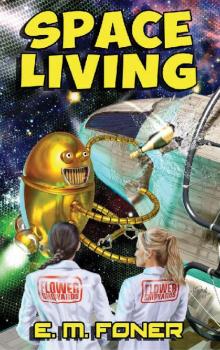 Space Living (EarthCent Universe Book 4)
Space Living (EarthCent Universe Book 4) Review Night on Union Station (EarthCent Ambassador Book 11)
Review Night on Union Station (EarthCent Ambassador Book 11) Assisted Living
Assisted Living Con Living
Con Living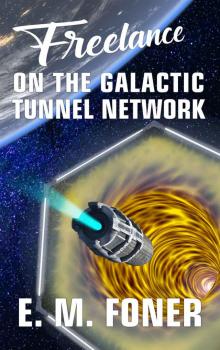 Freelance On The Galactic Tunnel Network
Freelance On The Galactic Tunnel Network Career Night on Union Station
Career Night on Union Station Career Night on Union Station (EarthCent Ambassador Book 15)
Career Night on Union Station (EarthCent Ambassador Book 15) Word Night on Union Station (EarthCent Ambassador Book 9)
Word Night on Union Station (EarthCent Ambassador Book 9)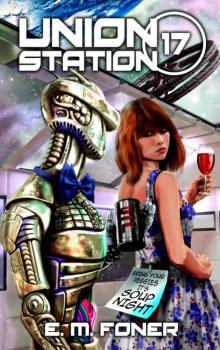 Soup Night on Union Station
Soup Night on Union Station Human Test
Human Test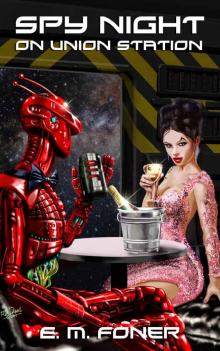 Spy Night on Union Station (EarthCent Ambassador Book 4)
Spy Night on Union Station (EarthCent Ambassador Book 4) Family Night on Union Station (EarthCent Ambassador Book 12)
Family Night on Union Station (EarthCent Ambassador Book 12) Party Night on Union Station (EarthCent Ambassador Book 10)
Party Night on Union Station (EarthCent Ambassador Book 10)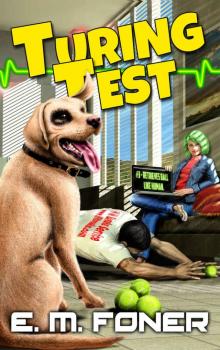 Turing Test
Turing Test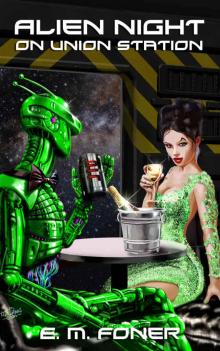 Alien Night on Union Station (EarthCent Ambassador Book 2)
Alien Night on Union Station (EarthCent Ambassador Book 2) Wanderers On Union Station (EarthCent Ambassador Book 6)
Wanderers On Union Station (EarthCent Ambassador Book 6) Vacation on Union Station (EarthCent Ambassador Book 7)
Vacation on Union Station (EarthCent Ambassador Book 7) Book Night on Union Station (EarthCent Ambassasor 13)
Book Night on Union Station (EarthCent Ambassasor 13) LARP Night on Union Station
LARP Night on Union Station Carnival On Union Station (EarthCent Ambassador Book 5)
Carnival On Union Station (EarthCent Ambassador Book 5) LARP Night on Union Station (EarthCent Ambassador Book 14)
LARP Night on Union Station (EarthCent Ambassador Book 14) Book Night on Union Station
Book Night on Union Station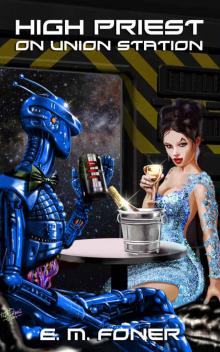 High Priest on Union Station (EarthCent Ambassador Book 3)
High Priest on Union Station (EarthCent Ambassador Book 3)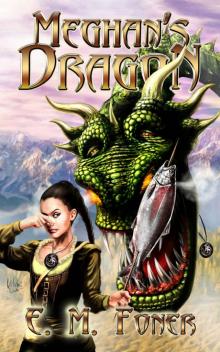 Meghan's Dragon
Meghan's Dragon Human Test (AI Diaries Book 2)
Human Test (AI Diaries Book 2) Guest Night on Union Station
Guest Night on Union Station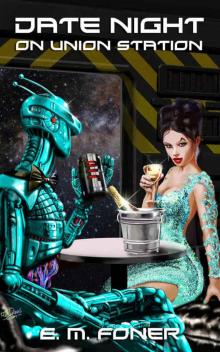 Date Night on Union Station
Date Night on Union Station